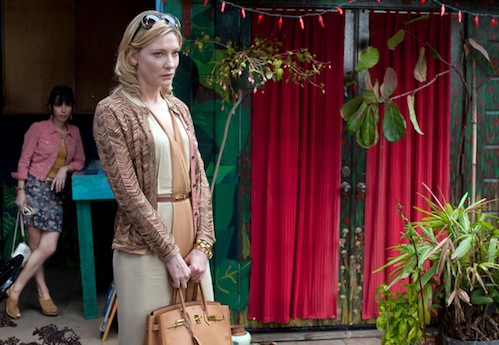 Woody Allen’s new movie, “Blue Jasmine,” has been called a “mash-up” (“a song or composition created by blending two or more pre-recorded songs, usually by overlaying the vocal track of one song seamlessly over the instrumental track of another,” Wikipedia). Its plot is a combination of the Tennessee William’s 1947 play, “A Streetcar Named Desire” and the Bernie Madoff saga.
Woody Allen’s new movie, “Blue Jasmine,” has been called a “mash-up” (“a song or composition created by blending two or more pre-recorded songs, usually by overlaying the vocal track of one song seamlessly over the instrumental track of another,” Wikipedia). Its plot is a combination of the Tennessee William’s 1947 play, “A Streetcar Named Desire” and the Bernie Madoff saga.
The Blanche Dubois character from Streetcar is played by Cate Blanchett. She is down on her luck after her high-flying Wall Street financier husband crashes and burns in spectacular fashion as a result of the 2008-2009 financial crisis. The husband is perfectly cast, with Alec Baldwin as the swindler brought low. (It doesn’t get any lower than committing suicide in prison after conviction on multiple counts of criminal fraud.)
The Blanchett character, Jasmine (formerly “Jeanette,” in an earlier, less, rarefied existence) has a “nervous breakdown” after the couple’s fall from grace. Gone are the beach house in the Hamptons, the Fifth Avenue co-op, the jewels, paintings, and, above all, the ill-gotten money that fuels the whole extravagant, but shallow, lifestyle.
Humbled financially, but still defiant emotionally, Blanchett’s Jasmine/Jeanette flees to San Francisco. She moves in with her sister Ginger, played by Sally Hawkins, who has stayed close to their blue collar heritage.
As she struggles to become financially self-supporting, she also must adjust to her new life-style and the harsh reality that confronts her. She has to contend with Ginger’s ex-husband, “Augie,” played by Andrew Dice Clay to perfection, still angry at losing his money in one of the Alec Baldwin character’s investment schemes, as well as “Chili” (Bobby Cannevale), Ginger’s new boyfriend in the Stanley Kowalski role played by Marlon Brando in the original “Streetcar.”
 The story is told over time, in a series of flashbacks, which highlight the contrast between Jasmine’s glamorous past and gritty present. Although all the cast is superb, Blanchett’s performance is transcendent. She has an emotional range and depth that astounds. She plays off the social detail with a nuance and subtlety not seen since the days of Bette Davis and Joan Crawford.
The story is told over time, in a series of flashbacks, which highlight the contrast between Jasmine’s glamorous past and gritty present. Although all the cast is superb, Blanchett’s performance is transcendent. She has an emotional range and depth that astounds. She plays off the social detail with a nuance and subtlety not seen since the days of Bette Davis and Joan Crawford.
Someone said Alec Baldwin plays himself, the arrogant, amoral alpha male that he is in real life by all accounts. So what? Sometimes playing to type is the hardest acting job of all, something that many actors dread because they can become stale and predictable. Baldwin gets points for taking chances. (Interestingly, he was “Streetcar’s” Stanley Kowalski in a 1992 off-Broadway revival!)
What makes this movie even more admirable is its bid for a wider audience than the usual art-house fare. (It’s being shown on 1,200 screens nationwide.) Some reviewers want to make simplistic political points out of the film’s story. I prefer to see it as a tragedy in the way the works of Thomas Hardy are, the misalignment of society’s processes and the needs of the individual.
There are no easy answers or obvious scapegoats for the maelstrom we went through five years ago, notwithstanding the wishful thinking of ideologues.
If you want to understand what happened and what it cost, though, you need to see this movie. Now showing at Cinemark Plaza at the Plaza, Cinemark 20 & AMC Ward Parkway 14, AMC Barry Woods 24, Glenwood Arts, AMC Town Centre 20, AMC Independence Commons 20, and AMC Studio 30.









